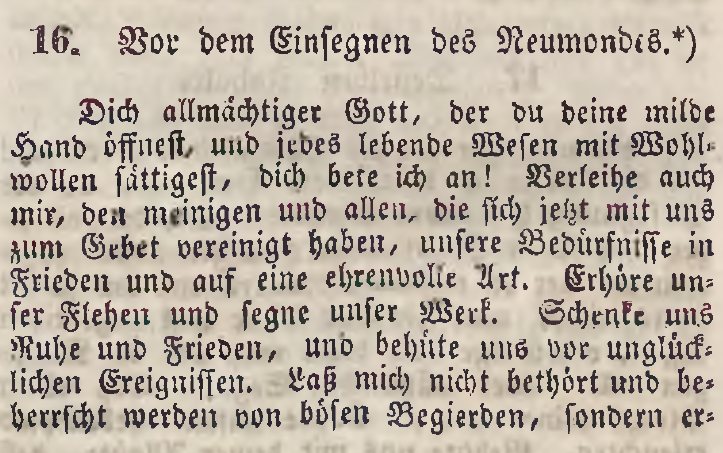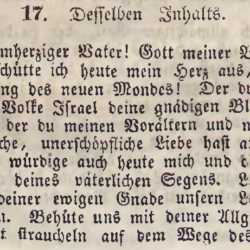| Source (German) | Translation (English) |
|---|---|
Wenn die Hausfrau an den Vorabenden des Sabaths und der Feiertage die Lichte anzündet. |
When the housewife kindles the lights on the evenings of Shabbat and Yontef. |
Gott des Lichtes und der Wahrheit! Der Mensch, ein sinnliches Wesen, leicht zerstreut von allem, was ihn umgiebt, leicht hingerissen, sowohl von den Freuden, als auch von den Mühen des Lebens, wie leicht würde er versinken in den kleinlichen Sorgen für die Fristung seines irdischen Lebens, wie leicht würde er alle höhern Beziehungen des Lebens vergessen, wenn wir nicht sinnliche Erinnerungsmittel hätten, die uns dem irdischen entziehen, und den Blick unseres Geistes auf das Hohe, Heilige richten. So haben unsere Weisen verordnet, dem Sabath zu Ehren zwei Lichte anzuzünden. |
God of light and truth! Man, a sensory being, easily distracted by all that surrounds him, easily carried away both by the pleasures and the troubles of life, how easily he would sink into the petty concerns of the term of his earthly life, how easily he would forget all the higher relationships of life, if we did not have sensory means of remembrance, which take us away from the earthly, and direct the gaze of our spirit to the high, holy. Thus our sages have decreed to kindle two lights in honor of Shabbat. |
Quelle des Lichtes, der du Israel und den Sabath geheiligt, laß mich die hohe Bedeutung der Handlung, die ich eben verrichtet, nie vergessen! Licht, das sei mein Wunsch und mein Verlangen! Wie jedes vernunftlose Wesen sich zum irdischen Lichte neigt, so wollen wir unsern Geist und unser Gemüth stets auf den richten, der der Urquell des Lichtes, der höchsten Weisheit, der tiefsten Einsicht ist, auf ihn den Allweisen. Licht ist das Gesetz, das du uns am Sinai gegeben. Heil dem, der in diesem Lichte wandelt, bis er einst kommt zum Quell des Lebens, wo er das himmlische Licht schauet. |
Source of light, you who sanctified Yisrael and Shabbat, let me never forget the high significance of the act I have just performed! Light, let it be my wish and my desire! As every irrational being leans towards the earthly light, so let us always direct our spirit and our mind towards him who is the source of light, of the highest wisdom, of the deepest insight, towards him the All-Wise. Light is the law that you gave us at Sinai. Hail to him who walks in this light until he comes to the fountain of life, where he sees the heavenly light. |
O Allgütiger, leite unser Herz, daß ich und meine Kinder nie von deinem Lichte weichen! Licht im Geiste, Wohlwollen und Menschenliebe im Herzen, so wollen wir deiner werth werden; und so wollen wir den heiligen Ruhetag feiern, durch Nachdenken über die Fortbildung unseres Geistes und unseres Herzens, um Licht und Liebe zu verbreiten, durch deine Hülfe. Amen. |
O All-Glorious, guide our hearts so that I and my children never depart from your light! Light in the spirit, goodwill and love of man in the heart, so we will become worthy of you; and so we will celebrate the holy day of rest, by reflecting on the development of our spirit and our heart, in order to spread light and love, through your help. Amen. |
“Wenn die Hausfrau an den Vorabenden des Sabaths und der Feiertage die Lichte anzündet” was written by Yehoshua Heshil Miro and published in his anthology of teḥinot, בית יעקב (Beit Yaaqov) Allgemeines Gebetbuch für gebildete Frauen mosaischer Religion. In the original 1829 edition, תחנות Teḥinot ein Gebetbuch für gebildete Frauenzimmer mosaischer Religion, it appears as teḥinah №13, on pp. 17-18. In the 1835 and 1842 editions, it appears as teḥinah №13 on pp. 20-21.
This transcription was derived by proofreading the output of Tesseract-OCR with its Fraktur script training data. This translation was derived by proofreading the output of the translation tools of DeepL and Google. –Aharon Varady
Source(s)



“Beim Lichtzünden | When kindling the lights (for Shabbat and Yontef), by Yehoshua Heshil Miro (1829)” is shared through the Open Siddur Project with a Creative Commons Attribution-ShareAlike 4.0 International copyleft license.










Leave a Reply